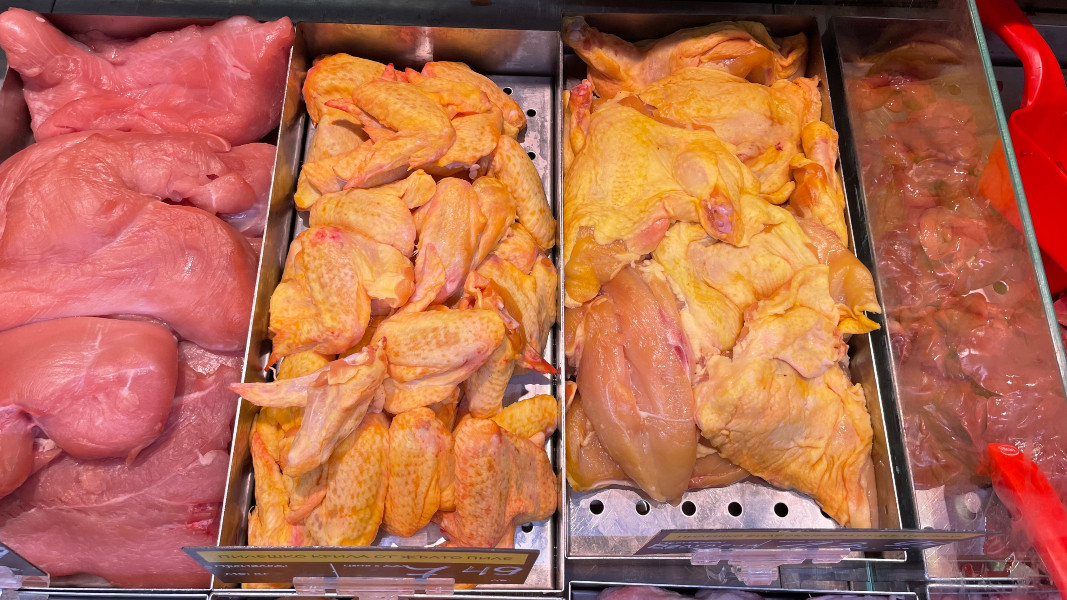The current situation in the sphere of poultry farming in Bulgaria is extremely alarming. Slowly but surely, the Bulgarian producers have been losing their positions on the local market by about 5% per year, while the demands of the poultry farmers have been ignored by several Bulgarian governments.
"Meat from Poland and Hungary displaces the meat produced in Bulgaria. The imported meat is always delivered to Bulgaria on Friday evening and I wouldn't say that it is of the best quality,” Ivaylo Galabov, chairman of the Union of Poultry Breeders in Bulgaria says and adds: “We have enough reasons to ask the Bulgarian Food Safety Agency to ensure constant control for salmonella, because on Friday afternoon, before the slaughterhouses are thoroughly washed and when the risk of salmonella is high, Poland and Hungary try to send their production to countries where control is lower, including Bulgaria."
The Union of Poultry Breeders has three demands: fiscal control, quality control ensuring absence of salmonella and correct labeling of the final products. "The mechanism is the same and applies to all types of meat on the market," Galabov points out.

"Labeling is a major problem. In the stores we do not see products with correct labels showing whether the respective product was obtained from fresh meat and what its origin is. If the label read that a certain product was made from defrosted meat from Poland, I'm not sure it would be bought with the same eagerness. We are some of the poorest consumers in Europe and people are tempted by the low prices. But if everything was written clearly on the product, every user would be able to make an informed decision whether to buy a product or not. We simply want the same rules to apply for everyone on the market and we have been calling on several governments for this," Mr. Galabov says.

What is defrosted meat?
"Defrosting is a normal practice to thaw frozen meat and cook it,” Ivaylo Galabov says. “But in the cases I am talking about we see that frozen meat, which is 20 percent cheaper than fresh meat is bought. This meat is then thawed, cut, flavored, refrozen and sold. There is no demand for frozen meat in Europe, so it is shipped to destinations where people are willing to do something with it. Bulgaria is one of these places."
In European legislation, this way of processing meat is not prohibited, but it is applied to heat-treated products that are blanched and then frozen in order to guarantee their long shelf life. These are all kinds of chicken nuggets, croquettes, etc.

Ivaylo Galabov told us more about some of the practices on the Bulgarian market:
"The process consists of defrosting the meat and adding water, phosphates, etc., to make the product profitable. Defrosting and flavoring brings increased value to the operators and a bad taste in consumers’ mouths. It is even worse for the poultry farmers in Bulgaria, who want to make a living with honest business."
It is necessary to look for mechanisms to stimulate domestic production, but the new Strategic Plan, which is about to replace the current Rural Development Programs, envisages reduction of aid from 50 to 30%, while the current inflation levels put poultry farming and animal breeding at risk, people working in the industry say.
Photos: BGNES, Pixabay
English: Al. Markov
Romania’s coalition government survives no-confidence motion The first no-confidence motion against Romania’s coalition government, led by Prime Minister Ilie Bolojan, was rejected by the Romanian parliament, AGERPRES reported. The vote..
Three evenings of live rock music are set to energise the mountain resort of Bansko this week, as the Municipality hosts a festival showcasing some of Bulgaria’s most popular bands. From July 17 to 19 , performers including Ahat, No More Many More,..
Payment of the new, higher pensions, which came into effect at the start of the month, has begun. This increase was implemented under the so-called 'Swiss rule', which adjusts pensions in Bulgaria in line with inflation. This time, the increase is 8.6%...
It has been a sad summer we have been having. With temperatures soaring to over 40°C, not forgetting human carelessness and irresponsibility, hundreds..
One month after the dramatic events in Bat Yam , where thirteen Bulgarian artists were forced to take shelter in a bomb bunker during Iran’s missile..

+359 2 9336 661
